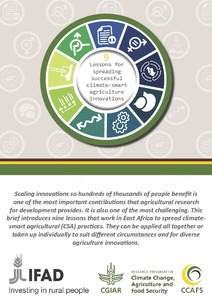Nine ways to make agriculture more climate-smart
CSA and its principles: food security, mitigation, and adaptation, have been widely recognized as key elements for decision makers to include to meet the Sustainable Development Goals. Yet implementing successful innovations on a wider scale across nations – and even geographies – remains a challenge. CSA cannot be a useful tool to combat climate change and ensure food security if innovations are not adopted – whatever the reason for their neglect.
In this series of briefs, we present nine lessons crucial for successfully scaling CSA innovations that deliver on the three pillars while addressing a myriad factors underpinning climate science. Our lessons can guide decision makers and prioritize limited climate investments for maximum impact at least cost, targeting vulnerable groups. The lessons, gleaned through the “Increasing Food Security and Farming System Resilience in East Africa through Wide-scale Adoption of Climate-Smart Agricultural Practices” project in Tanzania and Uganda, are applicable globally and have already been used to scale out successful practices to a wider set of beneficiaries.

